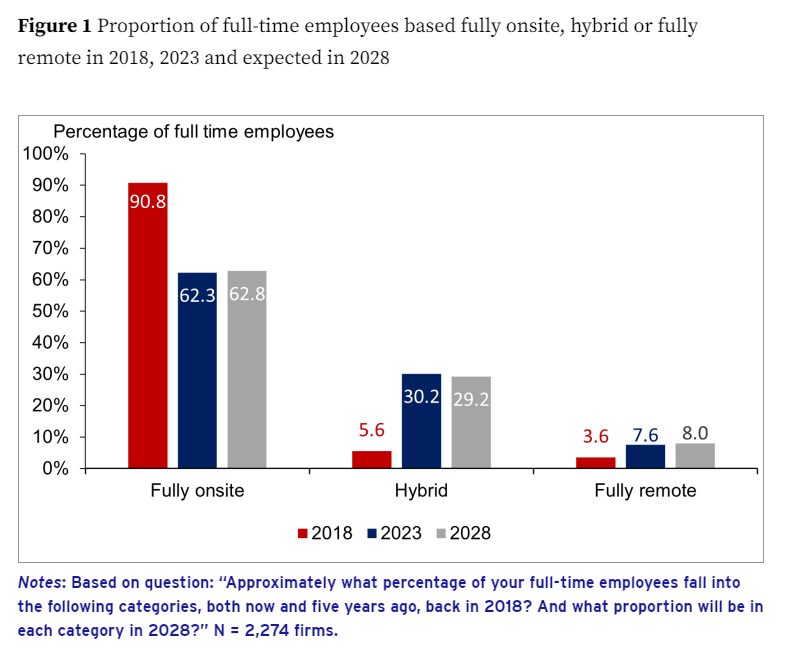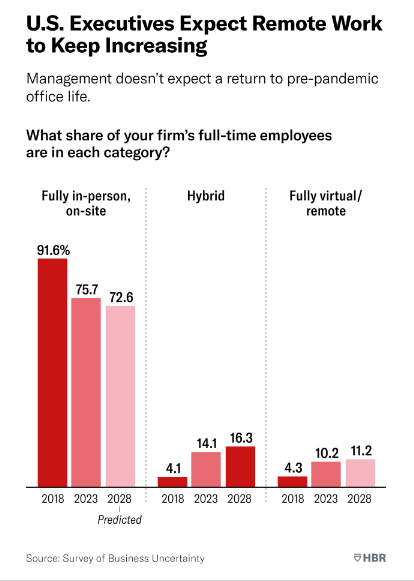‘The RTO debate should end’: Nick Bloom
This declaration by the Stanford professor of economics, and leading working from home researcher, comes as new data suggests remote work rates will stay the same over the next five years.
News In Brief
Nick Bloom, leading working from home researcher at Stanford, predicts that remote and hybrid working is going nowhere.
This is based on new UK and US data that shows leaders expect remote and hybrid working to stay consistent over the next few years, and maybe even increase.
Here's the inside track!
Nick Bloom, Stanford University professor and long-time working from home researcher, declared on LinkedIn: “The RTO debate should end. There is no RTO and leaders confirm this.”
This statement is response to new data from the Bank of England, Stanford University, Kings College London and Nottingham University.
Their research into 2,500 UK firms found that leaders forecast that their company’s 2023 levels of remote and hybrid work will remain at the same level in five years time in 2028.
As things stand, 30% of employees at the 2,500 companies surveyed were hybrid, while 8% were remote, and the figures look similar for 2028. This compares to 6% hybrid and 4% remote five years ago in 2018.

This corroborates previous US research by Bloom published in Harvard Business Review in 2023.
Bloom and his peers at the University of Chicago and the Atlanta Federal Reserve Bank surveyed 500 US businesses and found that they expected the rate of remote and hybrid work to grow in the next five years.

All of this data backs up Bloom’s recent 2024 predictions, published by Scoop’s Flex report.
For Bloom, while 2024 may see a stabilization of remote work, he expects a steady climb in 2025 (and beyond) “as new technologies improve and enable remote work”.
Hiding underneath the stabilization in 2024 is a “massive revolution” – “this is the revolution of how work from home is now 5x more common than just 5 years earlier. Work from home is here to stay”.
Why is remote work popular
There are a few reasons for the continued positivity around remote work; most notably the productivity and efficiency benefits.
The Bank of England research found that “for each extra day a firm’s average employee works remotely, that firm’s productivity is around £15,000 higher”.
It is important to note that this link is not necessarily causal, but overall, “hybrid work seems to have little net effect on productivity and may increase it”, according to Harvard Business Review.
Plus, remote and hybrid work saves employees (and employers alike) money.
Workers also generally like working from home (and the data continues to show it is major factor in why they stay in their jobs, with some even being prepared to take a pay cut for more flexible working options), and there have been significant technological improvements since COVID-19 that have enabled efficient remote work.
Both studies also found that newer companies are even more pro-remote work, and this may have an impact on country-wide remote work rates.
Writing in Harvard Business Review, Bloom and his co-authors shared: “Remote work will increase because startups born since the pandemic are more likely to use it. As these younger firms grow, the share of jobs offering remote work will increase.”
The Bank of England data concluded that “young firms tend to grow more quickly than older more established firms, and assuming that continues to be the case and their higher use of remote working reflects a cohort effect, the prevalence of remote working across the economy as a whole could continue to increase in the future as these younger firms make up a growing share of the economy.”
The survey predicts, if these newer companies grow at the same rate over the next five years (as they have done since 2018), the total remote days by 2028 could be up 18%.
Ultimately, it is clear that remote work is stabilizing – it is time for companies to no longer obsess about where people work, and instead focus on how they work.
This is another message in Scoop’s recent 2024 predictions Flex Report.
Annie Dean, VP of Team Anywhere at Atlassian, a tech company has fully embraced remote and flexible work shared:
“What sets innovative organizations apart, no matter where someone sits, is how work happens.
Companies will be defined by whether or not processes are efficient, the way meetings are run, and whether leaders are willing to disrupt existing norms with new tools, practices, and AI.
“Leaders and teams who actively seek out more effective (and fun!) technologies and norms will be the ones to attract top talent.”
Stay tuned to get the inside track from Dean about Atlassian’s remote work success to date in UNLEASH.
Sign up to the UNLEASH Newsletter
Get the Editor’s picks of the week delivered straight to your inbox!

Chief Reporter, UNLEASH
Allie is an award-winning business journalist and can be reached at alexandra@unleash.ai.
Contact Us
"*" indicates required fields
Partner with UNLEASH
"*" indicates required fields